Consumer Behavior Report: Hyper Consumption, Ethics, and Solutions
VerifiedAdded on 2020/11/12
|8
|1913
|434
Report
AI Summary
This report delves into the multifaceted realm of consumer behavior, with a particular focus on the phenomenon of hyper consumption and its far-reaching implications. It begins by defining consumer behavior and highlighting the rise of hyper consumption, emphasizing its adverse effects on individuals, communities, and the environment. The report then transitions into an ethical and sustainability viewpoint, exploring deontological and consequentialist ethics as frameworks for addressing overconsumption. It examines how these ethical perspectives can guide actions towards more responsible consumption patterns. Furthermore, the report investigates the role of social media in either exacerbating or alleviating hyper consumption, analyzing its influence on consumer behavior and providing insights into effective marketing strategies. Finally, the report concludes with a set of recommendations aimed at improving consumer behavior and fostering sustainable practices, suggesting actionable steps for companies and consumers alike. The report underscores the importance of transparency, consumer feedback, and ethical considerations in promoting a more balanced and responsible approach to consumption.
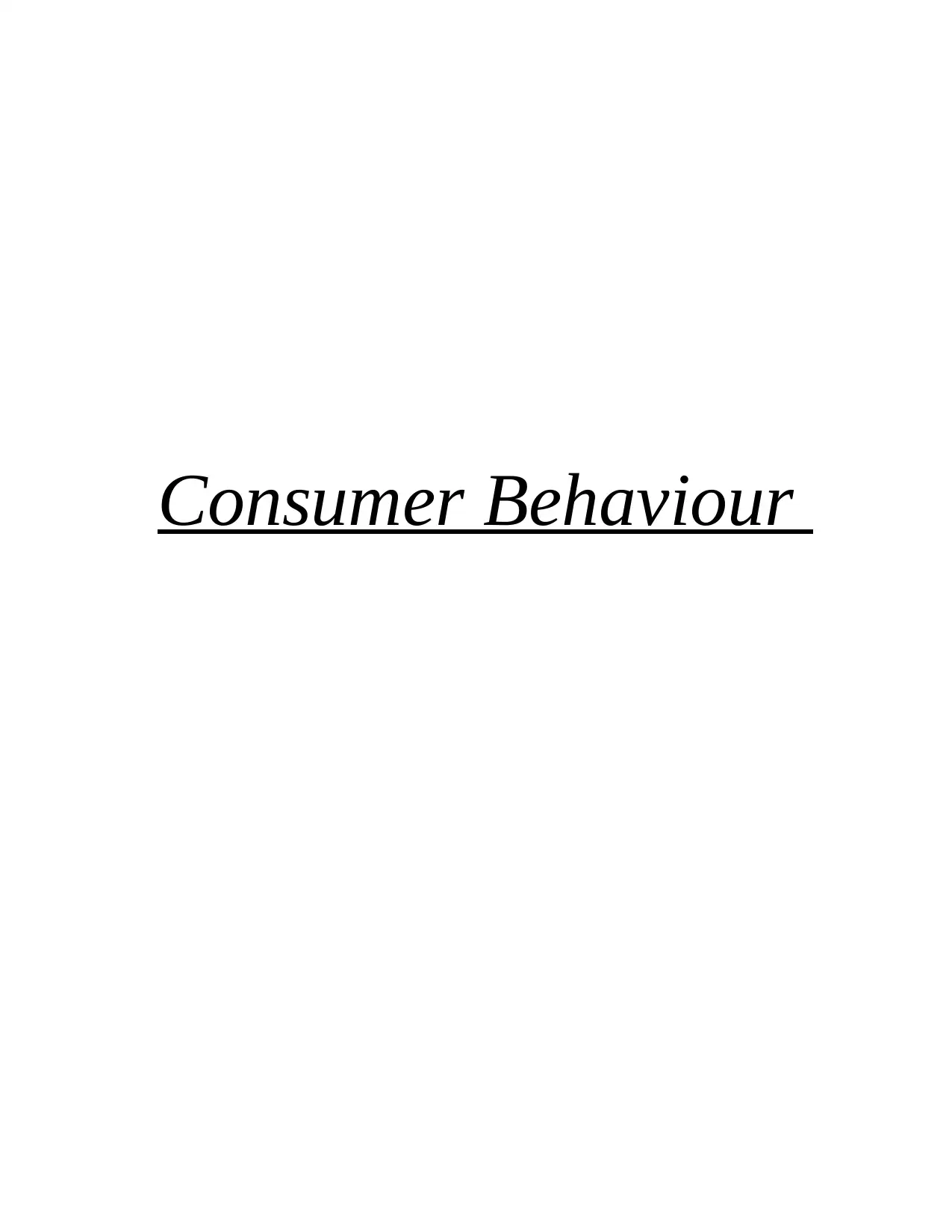
Consumer Behaviour
Paraphrase This Document
Need a fresh take? Get an instant paraphrase of this document with our AI Paraphraser

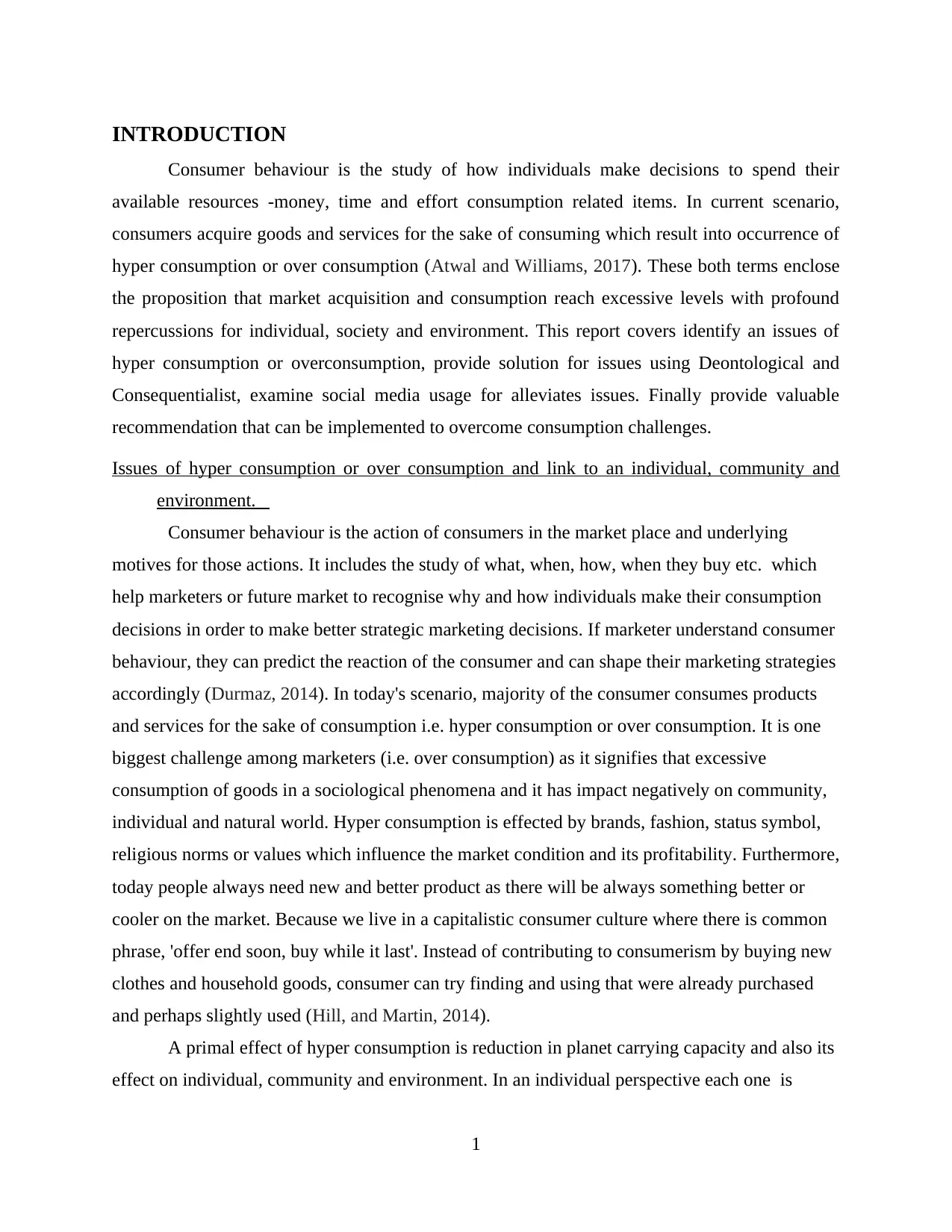
INTRODUCTION
Consumer behaviour is the study of how individuals make decisions to spend their
available resources -money, time and effort consumption related items. In current scenario,
consumers acquire goods and services for the sake of consuming which result into occurrence of
hyper consumption or over consumption (Atwal and Williams, 2017). These both terms enclose
the proposition that market acquisition and consumption reach excessive levels with profound
repercussions for individual, society and environment. This report covers identify an issues of
hyper consumption or overconsumption, provide solution for issues using Deontological and
Consequentialist, examine social media usage for alleviates issues. Finally provide valuable
recommendation that can be implemented to overcome consumption challenges.
Issues of hyper consumption or over consumption and link to an individual, community and
environment.
Consumer behaviour is the action of consumers in the market place and underlying
motives for those actions. It includes the study of what, when, how, when they buy etc. which
help marketers or future market to recognise why and how individuals make their consumption
decisions in order to make better strategic marketing decisions. If marketer understand consumer
behaviour, they can predict the reaction of the consumer and can shape their marketing strategies
accordingly (Durmaz, 2014). In today's scenario, majority of the consumer consumes products
and services for the sake of consumption i.e. hyper consumption or over consumption. It is one
biggest challenge among marketers (i.e. over consumption) as it signifies that excessive
consumption of goods in a sociological phenomena and it has impact negatively on community,
individual and natural world. Hyper consumption is effected by brands, fashion, status symbol,
religious norms or values which influence the market condition and its profitability. Furthermore,
today people always need new and better product as there will be always something better or
cooler on the market. Because we live in a capitalistic consumer culture where there is common
phrase, 'offer end soon, buy while it last'. Instead of contributing to consumerism by buying new
clothes and household goods, consumer can try finding and using that were already purchased
and perhaps slightly used (Hill, and Martin, 2014).
A primal effect of hyper consumption is reduction in planet carrying capacity and also its
effect on individual, community and environment. In an individual perspective each one is
1
Consumer behaviour is the study of how individuals make decisions to spend their
available resources -money, time and effort consumption related items. In current scenario,
consumers acquire goods and services for the sake of consuming which result into occurrence of
hyper consumption or over consumption (Atwal and Williams, 2017). These both terms enclose
the proposition that market acquisition and consumption reach excessive levels with profound
repercussions for individual, society and environment. This report covers identify an issues of
hyper consumption or overconsumption, provide solution for issues using Deontological and
Consequentialist, examine social media usage for alleviates issues. Finally provide valuable
recommendation that can be implemented to overcome consumption challenges.
Issues of hyper consumption or over consumption and link to an individual, community and
environment.
Consumer behaviour is the action of consumers in the market place and underlying
motives for those actions. It includes the study of what, when, how, when they buy etc. which
help marketers or future market to recognise why and how individuals make their consumption
decisions in order to make better strategic marketing decisions. If marketer understand consumer
behaviour, they can predict the reaction of the consumer and can shape their marketing strategies
accordingly (Durmaz, 2014). In today's scenario, majority of the consumer consumes products
and services for the sake of consumption i.e. hyper consumption or over consumption. It is one
biggest challenge among marketers (i.e. over consumption) as it signifies that excessive
consumption of goods in a sociological phenomena and it has impact negatively on community,
individual and natural world. Hyper consumption is effected by brands, fashion, status symbol,
religious norms or values which influence the market condition and its profitability. Furthermore,
today people always need new and better product as there will be always something better or
cooler on the market. Because we live in a capitalistic consumer culture where there is common
phrase, 'offer end soon, buy while it last'. Instead of contributing to consumerism by buying new
clothes and household goods, consumer can try finding and using that were already purchased
and perhaps slightly used (Hill, and Martin, 2014).
A primal effect of hyper consumption is reduction in planet carrying capacity and also its
effect on individual, community and environment. In an individual perspective each one is
1
⊘ This is a preview!⊘
Do you want full access?
Subscribe today to unlock all pages.

Trusted by 1+ million students worldwide
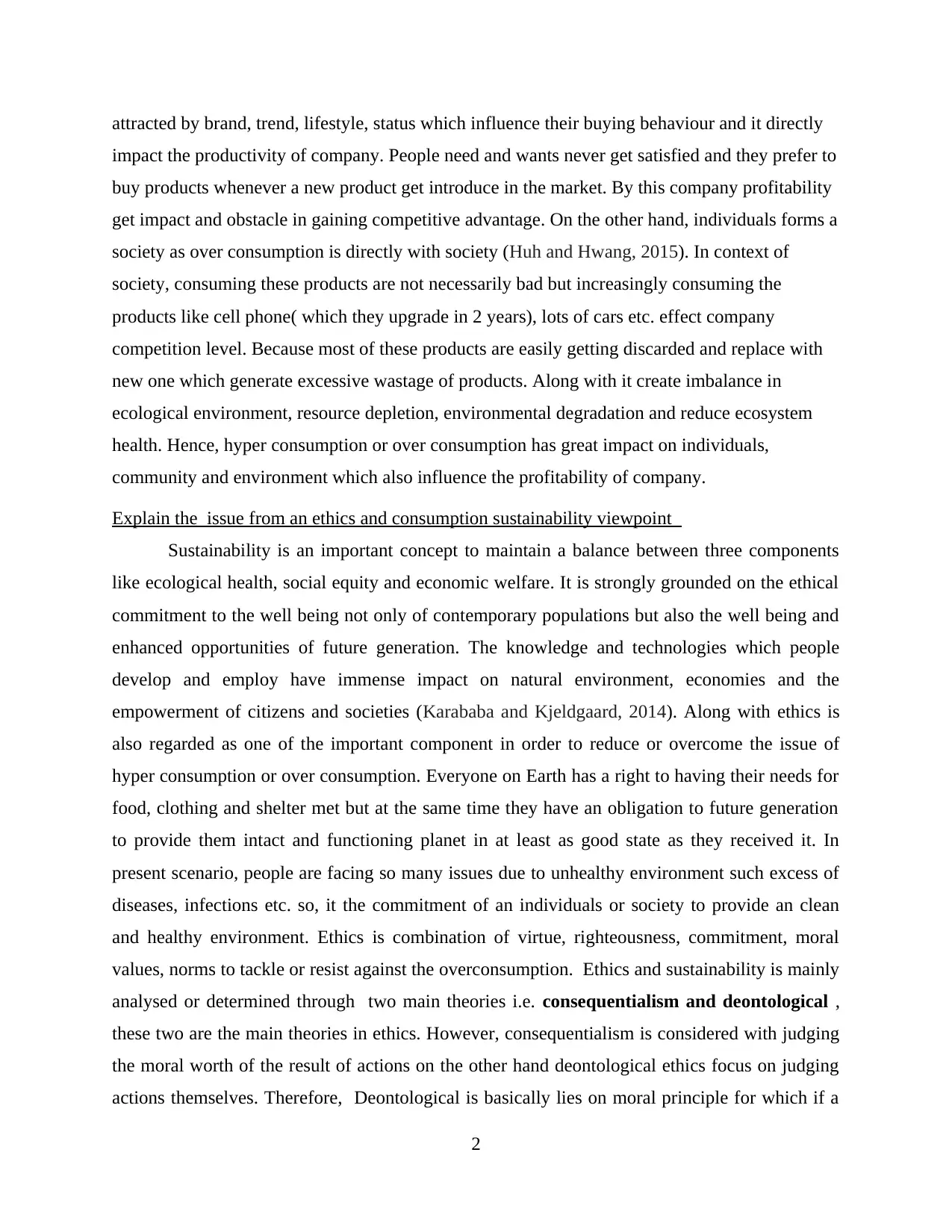
attracted by brand, trend, lifestyle, status which influence their buying behaviour and it directly
impact the productivity of company. People need and wants never get satisfied and they prefer to
buy products whenever a new product get introduce in the market. By this company profitability
get impact and obstacle in gaining competitive advantage. On the other hand, individuals forms a
society as over consumption is directly with society (Huh and Hwang, 2015). In context of
society, consuming these products are not necessarily bad but increasingly consuming the
products like cell phone( which they upgrade in 2 years), lots of cars etc. effect company
competition level. Because most of these products are easily getting discarded and replace with
new one which generate excessive wastage of products. Along with it create imbalance in
ecological environment, resource depletion, environmental degradation and reduce ecosystem
health. Hence, hyper consumption or over consumption has great impact on individuals,
community and environment which also influence the profitability of company.
Explain the issue from an ethics and consumption sustainability viewpoint
Sustainability is an important concept to maintain a balance between three components
like ecological health, social equity and economic welfare. It is strongly grounded on the ethical
commitment to the well being not only of contemporary populations but also the well being and
enhanced opportunities of future generation. The knowledge and technologies which people
develop and employ have immense impact on natural environment, economies and the
empowerment of citizens and societies (Karababa and Kjeldgaard, 2014). Along with ethics is
also regarded as one of the important component in order to reduce or overcome the issue of
hyper consumption or over consumption. Everyone on Earth has a right to having their needs for
food, clothing and shelter met but at the same time they have an obligation to future generation
to provide them intact and functioning planet in at least as good state as they received it. In
present scenario, people are facing so many issues due to unhealthy environment such excess of
diseases, infections etc. so, it the commitment of an individuals or society to provide an clean
and healthy environment. Ethics is combination of virtue, righteousness, commitment, moral
values, norms to tackle or resist against the overconsumption. Ethics and sustainability is mainly
analysed or determined through two main theories i.e. consequentialism and deontological ,
these two are the main theories in ethics. However, consequentialism is considered with judging
the moral worth of the result of actions on the other hand deontological ethics focus on judging
actions themselves. Therefore, Deontological is basically lies on moral principle for which if a
2
impact the productivity of company. People need and wants never get satisfied and they prefer to
buy products whenever a new product get introduce in the market. By this company profitability
get impact and obstacle in gaining competitive advantage. On the other hand, individuals forms a
society as over consumption is directly with society (Huh and Hwang, 2015). In context of
society, consuming these products are not necessarily bad but increasingly consuming the
products like cell phone( which they upgrade in 2 years), lots of cars etc. effect company
competition level. Because most of these products are easily getting discarded and replace with
new one which generate excessive wastage of products. Along with it create imbalance in
ecological environment, resource depletion, environmental degradation and reduce ecosystem
health. Hence, hyper consumption or over consumption has great impact on individuals,
community and environment which also influence the profitability of company.
Explain the issue from an ethics and consumption sustainability viewpoint
Sustainability is an important concept to maintain a balance between three components
like ecological health, social equity and economic welfare. It is strongly grounded on the ethical
commitment to the well being not only of contemporary populations but also the well being and
enhanced opportunities of future generation. The knowledge and technologies which people
develop and employ have immense impact on natural environment, economies and the
empowerment of citizens and societies (Karababa and Kjeldgaard, 2014). Along with ethics is
also regarded as one of the important component in order to reduce or overcome the issue of
hyper consumption or over consumption. Everyone on Earth has a right to having their needs for
food, clothing and shelter met but at the same time they have an obligation to future generation
to provide them intact and functioning planet in at least as good state as they received it. In
present scenario, people are facing so many issues due to unhealthy environment such excess of
diseases, infections etc. so, it the commitment of an individuals or society to provide an clean
and healthy environment. Ethics is combination of virtue, righteousness, commitment, moral
values, norms to tackle or resist against the overconsumption. Ethics and sustainability is mainly
analysed or determined through two main theories i.e. consequentialism and deontological ,
these two are the main theories in ethics. However, consequentialism is considered with judging
the moral worth of the result of actions on the other hand deontological ethics focus on judging
actions themselves. Therefore, Deontological is basically lies on moral principle for which if a
2
Paraphrase This Document
Need a fresh take? Get an instant paraphrase of this document with our AI Paraphraser
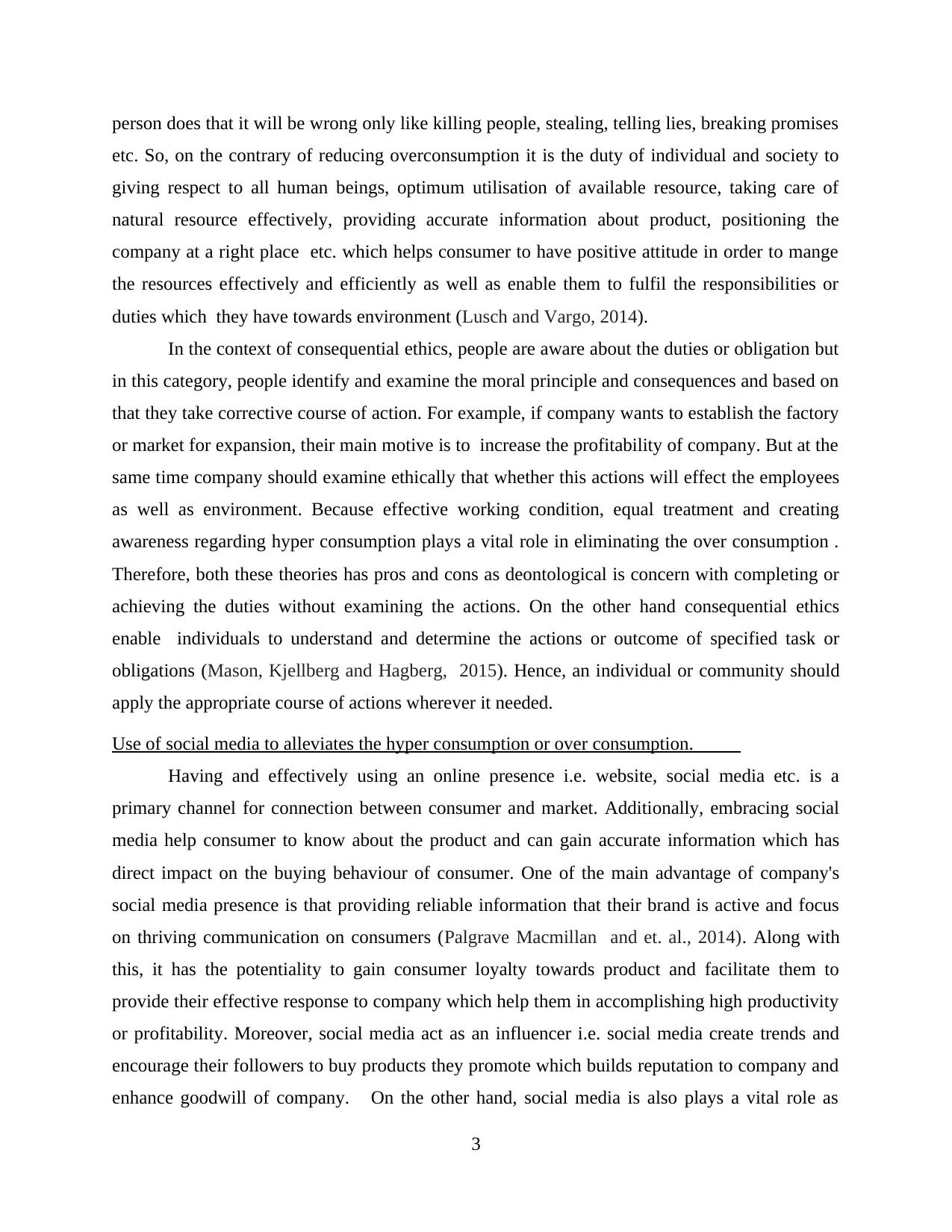
person does that it will be wrong only like killing people, stealing, telling lies, breaking promises
etc. So, on the contrary of reducing overconsumption it is the duty of individual and society to
giving respect to all human beings, optimum utilisation of available resource, taking care of
natural resource effectively, providing accurate information about product, positioning the
company at a right place etc. which helps consumer to have positive attitude in order to mange
the resources effectively and efficiently as well as enable them to fulfil the responsibilities or
duties which they have towards environment (Lusch and Vargo, 2014).
In the context of consequential ethics, people are aware about the duties or obligation but
in this category, people identify and examine the moral principle and consequences and based on
that they take corrective course of action. For example, if company wants to establish the factory
or market for expansion, their main motive is to increase the profitability of company. But at the
same time company should examine ethically that whether this actions will effect the employees
as well as environment. Because effective working condition, equal treatment and creating
awareness regarding hyper consumption plays a vital role in eliminating the over consumption .
Therefore, both these theories has pros and cons as deontological is concern with completing or
achieving the duties without examining the actions. On the other hand consequential ethics
enable individuals to understand and determine the actions or outcome of specified task or
obligations (Mason, Kjellberg and Hagberg, 2015). Hence, an individual or community should
apply the appropriate course of actions wherever it needed.
Use of social media to alleviates the hyper consumption or over consumption.
Having and effectively using an online presence i.e. website, social media etc. is a
primary channel for connection between consumer and market. Additionally, embracing social
media help consumer to know about the product and can gain accurate information which has
direct impact on the buying behaviour of consumer. One of the main advantage of company's
social media presence is that providing reliable information that their brand is active and focus
on thriving communication on consumers (Palgrave Macmillan and et. al., 2014). Along with
this, it has the potentiality to gain consumer loyalty towards product and facilitate them to
provide their effective response to company which help them in accomplishing high productivity
or profitability. Moreover, social media act as an influencer i.e. social media create trends and
encourage their followers to buy products they promote which builds reputation to company and
enhance goodwill of company. On the other hand, social media is also plays a vital role as
3
etc. So, on the contrary of reducing overconsumption it is the duty of individual and society to
giving respect to all human beings, optimum utilisation of available resource, taking care of
natural resource effectively, providing accurate information about product, positioning the
company at a right place etc. which helps consumer to have positive attitude in order to mange
the resources effectively and efficiently as well as enable them to fulfil the responsibilities or
duties which they have towards environment (Lusch and Vargo, 2014).
In the context of consequential ethics, people are aware about the duties or obligation but
in this category, people identify and examine the moral principle and consequences and based on
that they take corrective course of action. For example, if company wants to establish the factory
or market for expansion, their main motive is to increase the profitability of company. But at the
same time company should examine ethically that whether this actions will effect the employees
as well as environment. Because effective working condition, equal treatment and creating
awareness regarding hyper consumption plays a vital role in eliminating the over consumption .
Therefore, both these theories has pros and cons as deontological is concern with completing or
achieving the duties without examining the actions. On the other hand consequential ethics
enable individuals to understand and determine the actions or outcome of specified task or
obligations (Mason, Kjellberg and Hagberg, 2015). Hence, an individual or community should
apply the appropriate course of actions wherever it needed.
Use of social media to alleviates the hyper consumption or over consumption.
Having and effectively using an online presence i.e. website, social media etc. is a
primary channel for connection between consumer and market. Additionally, embracing social
media help consumer to know about the product and can gain accurate information which has
direct impact on the buying behaviour of consumer. One of the main advantage of company's
social media presence is that providing reliable information that their brand is active and focus
on thriving communication on consumers (Palgrave Macmillan and et. al., 2014). Along with
this, it has the potentiality to gain consumer loyalty towards product and facilitate them to
provide their effective response to company which help them in accomplishing high productivity
or profitability. Moreover, social media act as an influencer i.e. social media create trends and
encourage their followers to buy products they promote which builds reputation to company and
enhance goodwill of company. On the other hand, social media is also plays a vital role as
3
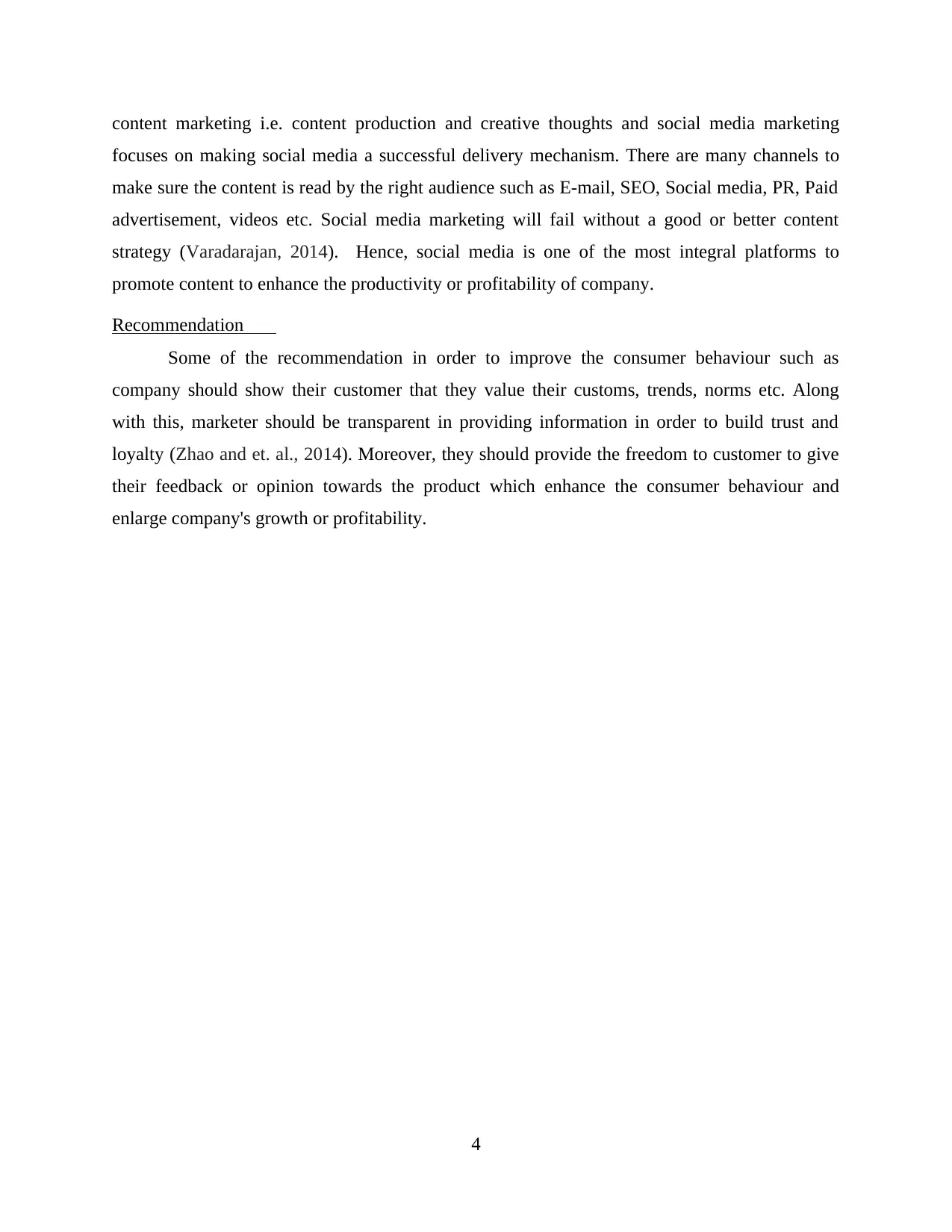
content marketing i.e. content production and creative thoughts and social media marketing
focuses on making social media a successful delivery mechanism. There are many channels to
make sure the content is read by the right audience such as E-mail, SEO, Social media, PR, Paid
advertisement, videos etc. Social media marketing will fail without a good or better content
strategy (Varadarajan, 2014). Hence, social media is one of the most integral platforms to
promote content to enhance the productivity or profitability of company.
Recommendation
Some of the recommendation in order to improve the consumer behaviour such as
company should show their customer that they value their customs, trends, norms etc. Along
with this, marketer should be transparent in providing information in order to build trust and
loyalty (Zhao and et. al., 2014). Moreover, they should provide the freedom to customer to give
their feedback or opinion towards the product which enhance the consumer behaviour and
enlarge company's growth or profitability.
4
focuses on making social media a successful delivery mechanism. There are many channels to
make sure the content is read by the right audience such as E-mail, SEO, Social media, PR, Paid
advertisement, videos etc. Social media marketing will fail without a good or better content
strategy (Varadarajan, 2014). Hence, social media is one of the most integral platforms to
promote content to enhance the productivity or profitability of company.
Recommendation
Some of the recommendation in order to improve the consumer behaviour such as
company should show their customer that they value their customs, trends, norms etc. Along
with this, marketer should be transparent in providing information in order to build trust and
loyalty (Zhao and et. al., 2014). Moreover, they should provide the freedom to customer to give
their feedback or opinion towards the product which enhance the consumer behaviour and
enlarge company's growth or profitability.
4
⊘ This is a preview!⊘
Do you want full access?
Subscribe today to unlock all pages.

Trusted by 1+ million students worldwide
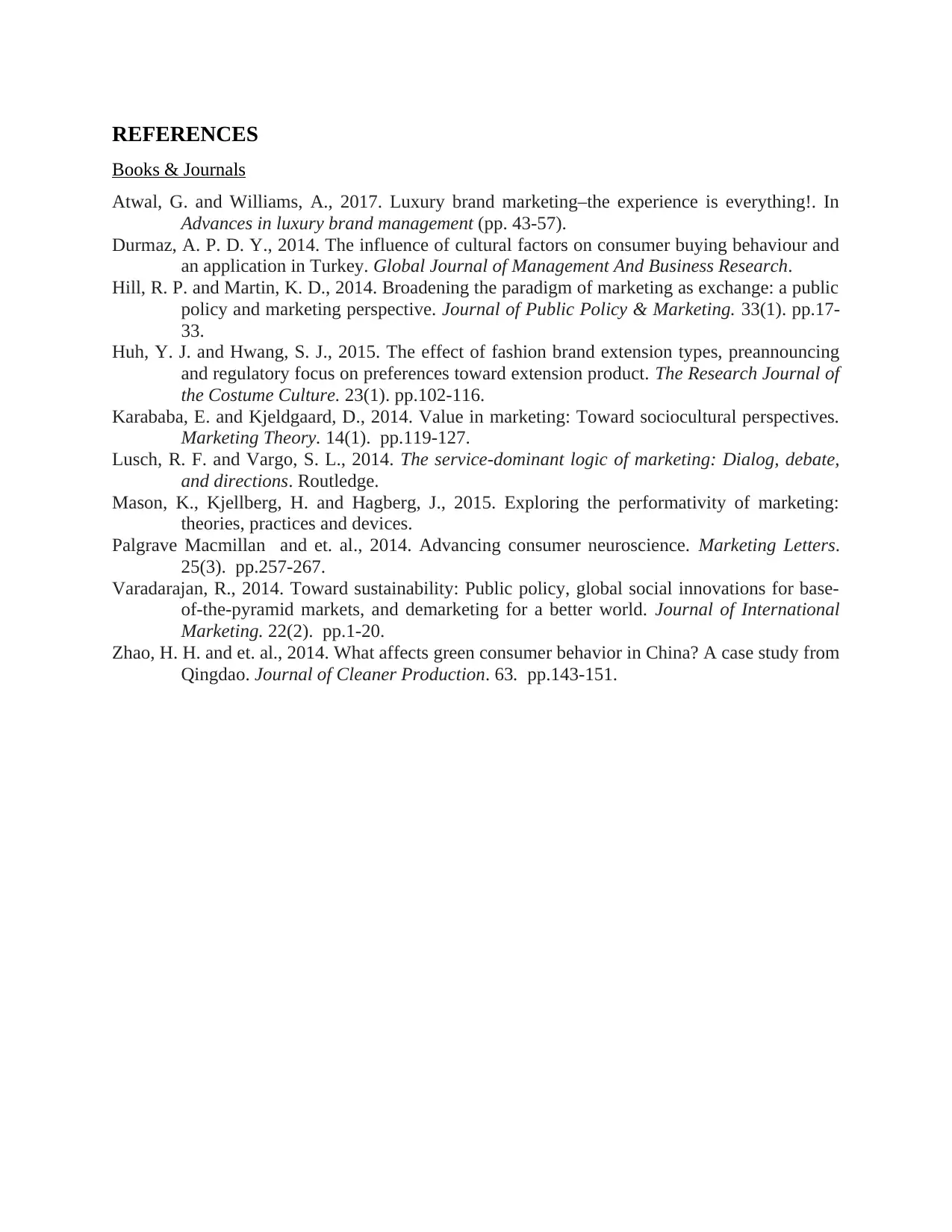
REFERENCES
Books & Journals
Atwal, G. and Williams, A., 2017. Luxury brand marketing–the experience is everything!. In
Advances in luxury brand management (pp. 43-57).
Durmaz, A. P. D. Y., 2014. The influence of cultural factors on consumer buying behaviour and
an application in Turkey. Global Journal of Management And Business Research.
Hill, R. P. and Martin, K. D., 2014. Broadening the paradigm of marketing as exchange: a public
policy and marketing perspective. Journal of Public Policy & Marketing. 33(1). pp.17-
33.
Huh, Y. J. and Hwang, S. J., 2015. The effect of fashion brand extension types, preannouncing
and regulatory focus on preferences toward extension product. The Research Journal of
the Costume Culture. 23(1). pp.102-116.
Karababa, E. and Kjeldgaard, D., 2014. Value in marketing: Toward sociocultural perspectives.
Marketing Theory. 14(1). pp.119-127.
Lusch, R. F. and Vargo, S. L., 2014. The service-dominant logic of marketing: Dialog, debate,
and directions. Routledge.
Mason, K., Kjellberg, H. and Hagberg, J., 2015. Exploring the performativity of marketing:
theories, practices and devices.
Palgrave Macmillan and et. al., 2014. Advancing consumer neuroscience. Marketing Letters.
25(3). pp.257-267.
Varadarajan, R., 2014. Toward sustainability: Public policy, global social innovations for base-
of-the-pyramid markets, and demarketing for a better world. Journal of International
Marketing. 22(2). pp.1-20.
Zhao, H. H. and et. al., 2014. What affects green consumer behavior in China? A case study from
Qingdao. Journal of Cleaner Production. 63. pp.143-151.
Books & Journals
Atwal, G. and Williams, A., 2017. Luxury brand marketing–the experience is everything!. In
Advances in luxury brand management (pp. 43-57).
Durmaz, A. P. D. Y., 2014. The influence of cultural factors on consumer buying behaviour and
an application in Turkey. Global Journal of Management And Business Research.
Hill, R. P. and Martin, K. D., 2014. Broadening the paradigm of marketing as exchange: a public
policy and marketing perspective. Journal of Public Policy & Marketing. 33(1). pp.17-
33.
Huh, Y. J. and Hwang, S. J., 2015. The effect of fashion brand extension types, preannouncing
and regulatory focus on preferences toward extension product. The Research Journal of
the Costume Culture. 23(1). pp.102-116.
Karababa, E. and Kjeldgaard, D., 2014. Value in marketing: Toward sociocultural perspectives.
Marketing Theory. 14(1). pp.119-127.
Lusch, R. F. and Vargo, S. L., 2014. The service-dominant logic of marketing: Dialog, debate,
and directions. Routledge.
Mason, K., Kjellberg, H. and Hagberg, J., 2015. Exploring the performativity of marketing:
theories, practices and devices.
Palgrave Macmillan and et. al., 2014. Advancing consumer neuroscience. Marketing Letters.
25(3). pp.257-267.
Varadarajan, R., 2014. Toward sustainability: Public policy, global social innovations for base-
of-the-pyramid markets, and demarketing for a better world. Journal of International
Marketing. 22(2). pp.1-20.
Zhao, H. H. and et. al., 2014. What affects green consumer behavior in China? A case study from
Qingdao. Journal of Cleaner Production. 63. pp.143-151.
Paraphrase This Document
Need a fresh take? Get an instant paraphrase of this document with our AI Paraphraser

2
1 out of 8
Related Documents
Your All-in-One AI-Powered Toolkit for Academic Success.
+13062052269
info@desklib.com
Available 24*7 on WhatsApp / Email
![[object Object]](/_next/static/media/star-bottom.7253800d.svg)
Unlock your academic potential
Copyright © 2020–2026 A2Z Services. All Rights Reserved. Developed and managed by ZUCOL.



